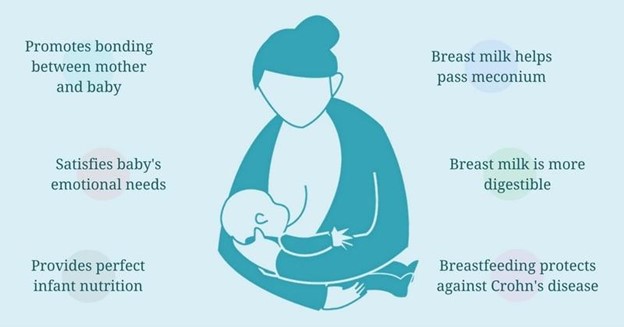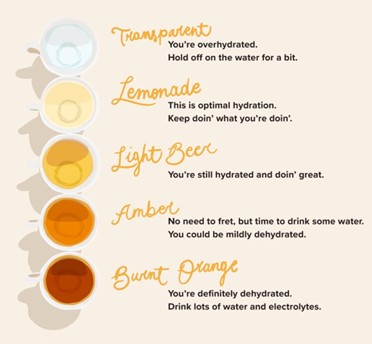Newborn Nutrition > Maternal & Newborn
Exam Review
Introduction
Total Questions : 5
Showing 5 questions, Sign in for moreA nurse is teaching a new mother about the benefits of breastfeeding.
Which of the following statements by the nurse is correct?
Explanation
Breastfeeding reduces the risk of infection by providing IgA antibodies and other immune factors.These antibodies help the baby fight off viruses and bacteria by forming a protective layer in the baby’s nose, throat, and digestive system.Breastfeeding also lowers the baby’s risk of sudden infant death syndrome (SIDS), obesity, and cardiovascular disease in adulthood.
Choice B is wrong because breastfeeding does not promote rapid brain growth due to large amounts of protein and fat.Breast milk contains the right amount of nutrients for the baby’s needs, but it does not have more protein and fat than formula.
Choice C is wrong because breastfeeding does not require iron supplementation for the newborn after 3 months of age.Breast milk has enough iron for the baby’s first 6 months of life, and after that solid foods can provide additional iron.
Choice D is wrong because breastfeeding is recommended exclusively for the first 6 months of age by the American Academy of Pediatrics, not 4 months.After 6 months, breastfeeding can continue along with solid foods until at least 1 year or longer.

A nurse is assessing a newborn who is formula fed.
Which of the following findings indicates adequate hydration?
Explanation
Pale yellow or clear urine indicates adequate hydration in a newborn.
The other choices are wrong because:
• Choice A: Weight loss of 8% in the first week is excessive and may indicate dehydration or inadequate feeding.
• Choice B: Urine output of 1 to 2 mL/kg/hr is too low for a newborn.The normal range is 2 to 5 mL/kg/hr.
• Choice C: Sunken fontanels and dry mucous membranes are signs of dehydration and should be reported to the provider.
Normal ranges for urine output vary by age.For a newborn, the normal range is 2 to 5 mL/kg/hr.
For a toddler, it is 1.5 mL/kg/hr, and for an older child

A nurse is planning to feed a newborn who is breastfed.
Which of the following actions should the nurse take?
Explanation
Feed the newborn when he shows signs of hunger, such as rooting or sucking.This is the best way to ensure that the newborn gets enough breast milk and that the mother’s milk supply is maintained.Breastfeeding on demand also helps prevent engorgement and mastitis.
Choice A is wrong because feeding the newborn every 4 to 5 hours during the day and night is too infrequent and may lead to insufficient weight gain, dehydration, jaundice, and low milk supply.Breastfed newborns should be fed at least every 2 to 3 hours or 8 to 12 times in 24 hours.
Choice B is wrong because feeding the newborn on one breast for 10 minutes and then switching to the other breast may not allow the newborn to get enough of the hindmilk, which is richer in fat and calories than the foremilk.The newborn should be allowed to nurse on one breast until it is emptied or until the baby releases it, and then offered the other breast.
Choice D is wrong because feeding the newborn 4 to 5 ounces of breast milk per feeding is too much for a newborn’s stomach capacity and may cause overfeeding, spitting up, or colic.
A nurse is calculating the fluid intake for a healthy newborn who weighs 3 kg.
How much fluid does the newborn need per day?
Explanation
360 to 504 mL.This is because the fluid intake for a healthy newborn is about120 to 168 mL/kg/day.
Since the newborn weighs 3 kg, the fluid intake per day is 3 x 120 to 3 x 168 mL, which equals 360 to 504 mL.
Choice A is wrong because 300 to 420 mL is too low for a 3 kg newborn.
Choice B is wrong because 330 to 462 mL is also too low for a 3 kg newborn.
Choice D is wrong because 390 to 546 mL is too high for a 3 kg newborn.
Normal ranges for fluid intake vary depending on the age and weight of the infant.For example, infants 0–6 months of age need about700 mLof fluid per day, assumed to be from milk.Infants 7–12 months of age need about800 mLof fluid per day from milk and complementary foods and beverages.Children 1–3 years of age need about1300 mLof fluid per day.
A nurse is providing teaching to a mother who is breastfeeding and is a vegetarian who excludes meat, fish, and dairy products from her diet.
Which of the following supplements should the nurse recommend for the mother to provide to her newborn?
Explanation
Vitamin B12.The mother should provide vitamin B12 supplements to her newborn because vitamin B12 is only found in animal products and is essential for the development of the nervous system and the production of red blood cells.A deficiency of vitamin B12 can cause anemia, weakness, fatigue, and neurological problems.
Choice A is wrong because vitamin D can be obtained from sunlight exposure, fortified foods, or supplements.
The mother and the newborn should get enough vitamin D from these sources.
Choice C is wrong because vitamin C is abundant in plant foods, such as fruits and vegetables.
The mother and the newborn should get enough vitamin C from their diet.
Choice D is wrong because vitamin K is produced by bacteria in the gut and is also found in green leafy vegetables.
The mother and the newborn should get enough vitamin K from these sources.However, all newborns are given a vitamin K injection at birth to prevent bleeding disorders.
Sign Up or Login to view all the 5 Questions on this Exam
Join over 100,000+ nursing students using Nursingprepexams’s science-backend flashcards, practice tests and expert solutions to improve their grades and reach their goals.
Sign Up Now

